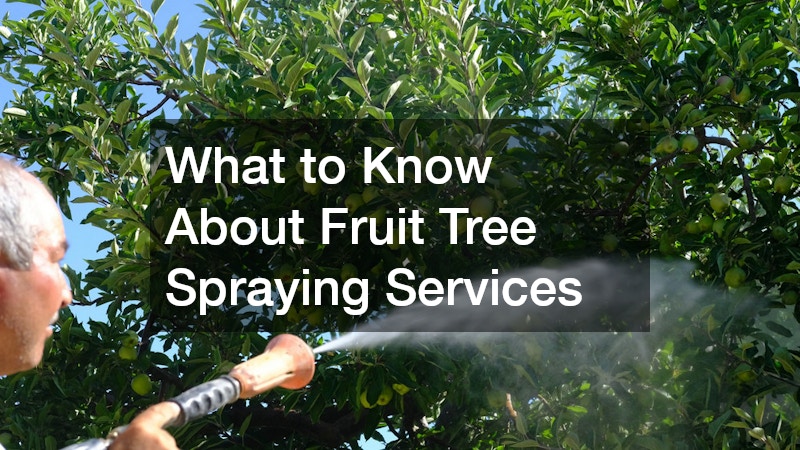Fruit tree spraying services play a crucial role in maintaining the health and productivity of fruit trees. These professional services assure that trees receive the right treatments to thrive and bear quality fruits.
What Are Fruit Tree Spraying Services?
Definition and Purpose
Fruit tree spraying services involve the application of various chemical and organic sprays to protect trees from pests and diseases. The primary objective of these services is to prevent infestations and enhance fruit quality.
By employing these services, tree owners can safeguard their investment and assure a bountiful harvest. These treatments are essential for both commercial orchards and home gardens, contributing to sustainable agriculture. The use of professional services also ensures the proper application of sprays, reducing the risk of environmental contamination. Experts are trained to handle delicate processes, making sure of both safety and efficacy.
Types of Sprays Used
There are several types of sprays that can be used in fruit tree care, including insecticides, fungicides, and nutrient sprays. Insecticides target harmful bugs that can devastate tree health, while fungicides help prevent and control diseases. Nutrient sprays, on the other hand, provide essential elements that might be lacking in the soil, enhancing growth and fruit yield. Each type of spray is selected based on the specific needs and conditions of the fruit trees. Organic options are also available for those looking to maintain an environmentally friendly practice in their gardens or orchards. It’s crucial to choose the right type for effective results while considering potential ecological impacts.
Why Is Spraying Fruit Trees Important?
Pest and Disease Control
Spraying fruit trees is vital for controlling pests and diseases that can undermine plant health and productivity. By regularly applying pest control measures, harmful insects and pathogens can be effectively managed. This preventative approach drastically reduces the chances of infestations that can lead to significant damage or loss of crops. Implementing spraying schedules tailored to specific threats ensures continued protection. In fact, neglecting these practices could result in the loss of entire harvests due to unchecked pest problems. Professional services offer peace of mind, knowing that experts are handling tree health with utmost care.
Enhancing Tree Health and Fruit Yield
Proper spraying not only controls pests but also significantly enhances the overall vigor of fruit trees. Healthy trees are more resilient against environmental stressors and can produce higher-quality fruit. The application of nutrient sprays enriches soil conditions, making sure trees receive balanced nutrition throughout their growth cycles. As a result, trees can grow stronger and produce more abundant yields. Regular spraying also encourages consistent fruit quality, which can be a critical factor for commercial growers seeking market-ready produce. Ultimately, these services can make a pivotal difference in the success of fruit production.
How Often Should Fruit Trees Be Sprayed?
Seasonal Spraying Schedules
Fruit tree spraying should align with growth cycles and seasonal changes to maximize effectiveness. Generally, spraying occurs several times a year during key stages like dormancy and bloom. Spring and summer are particularly crucial as trees become more active and susceptible to pest and disease pressures. Timed applications help shield tender growth and developing fruits. In the fall, sprays may focus on disease prevention, preparing trees for winter dormancy. Adhering to a seasonal plan ensures continuous protection and optimal plant health.
Signs That Indicate the Need for Spraying
Careful observation of your fruit trees can reveal signs indicating the need for spraying. Symptoms such as leaf discoloration, unusual spots, or the visible presence of insects suggest intervention is necessary. Additionally, poor growth, malformed fruits, or premature leaf drop can indicate underlying issues corrected by appropriate sprays. Timely attention to these signals can prevent the escalation of problems. Professional inspection can accurately diagnose these symptoms, offering targeted solutions to restore tree health. Being proactive rather than reactive is key to sustained tree vitality and productivity.
How to Choose the Right Spraying Service?
Factors to Consider
When selecting a fruit tree spraying service, consider factors such as experience, reputation, and cost. Qualified providers bring experience and reliable results, valuable for both novice and seasoned growers. Examining customer reviews and testimonials can offer insight into a provider’s track record and customer satisfaction. Pricing structures should also be transparent with no hidden fees. The right service will tailor its approach based on individual tree needs and owner goals. Engagement with reputable services can significantly enhance tree health and yield success.
Questions to Ask the Service Provider
Before hiring a spraying service, prepare key questions to evaluate their suitability. Inquire about the types of sprays used and their safety, making sure they align with your environmental beliefs. Ask about their experience with your specific tree species and any pest issues you’re experiencing. Understanding the application methods and follow-up support offered indicates service quality. Inquiring about certifications and their approach to environmental impacts also reflects a commitment to comprehensive care. Evaluation through thoughtful questioning ensures informed decisions.
Understanding the importance of fruit tree spraying services underscores their role in achieving healthy, productive trees. These services integrate preventative and proactive care for optimal results. By committing to regular spraying routines and selecting competent professionals, tree owners can secure their investment and enjoy bountiful harvests year after year. Their significance within agricultural practices is undeniable.


